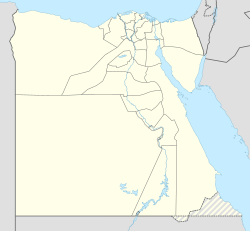KV65 is a tomb commencement in the Western Valley of the Kings, near Luxor, Egypt. It was discovered in 2018 by a team led by the Egyptologist Zahi Hawass and announced in 2019.[1][2] The tomb consists of a sloping rectangular pit of similar proportions to the entrances of royal tombs from the Eighteenth Dynasty. It contained a variety of items consisting of construction tools, pieces of rope, animal bones, leather, pottery, and food remains. It may represent a cache where the remains of a funerary feast and embalming material was buried, similar to KV54, the embalming cache of Tutankhamun.[3]
| KV65 | |
|---|---|
| Burial site of unknown | |
| Coordinates | 25°44′27″N 32°36′8″E / 25.74083°N 32.60222°E |
| Location | Western Valley of the Kings |
| Discovered | 2018 |
| Excavated by | Zahi Hawass (2018–22) |
← Previous KV64 | |
Previous use of KV65 designation
editThe discovery of a tomb in the Valley of the Kings designated KV65 was announced in August 2008. The tomb entrance was said to be of Eighteenth Dynasty style but nothing of its layout, decoration or owner was announced.[4][5]
References
edit- ^ "New Discoveries" (PDF). Nile Magazine. Bournemouth, UK: Select Publication Services. November–December 2019. Retrieved 3 April 2023.
- ^ El-Aref, Nevine (10 October 2019). "Zahi Hawass announces two archaeological discoveries by his team in Luxor – Ancient Egypt – Antiquities". Ahram Online. Retrieved 3 April 2023.
- ^ Hawass, Zahi (2022). "The Discovery of KV 65 in the West Valley of the Kings". In Kawai, Nozomu; Davies, Benedict G. (eds.). The Star Who Appears in Thebes: Studies in Honour of Jiro Kondo. UK: Abercromby Press. pp. 153–169. ISBN 978-1-912246-13-7.
- ^ Zahi Hawass. "Spotlight Interview: 2008". The Plateau: Official Website for Dr. Zahi Hawass. Retrieved 2008-08-15.
- ^ Paul Rymer (22 August 2008). "Zahi Hawass lecture – notes by Paul Rymer". Egyptology News. Retrieved 2008-08-22.
